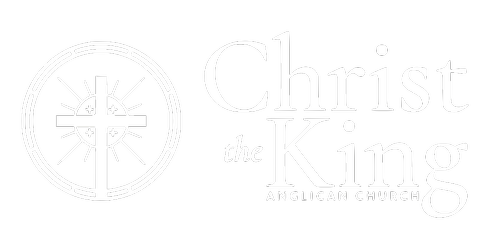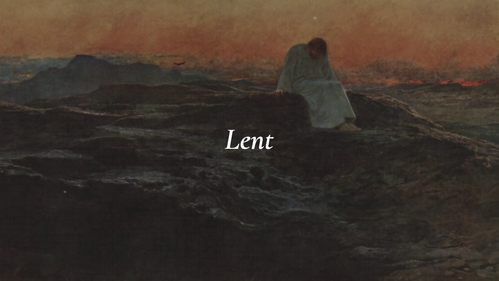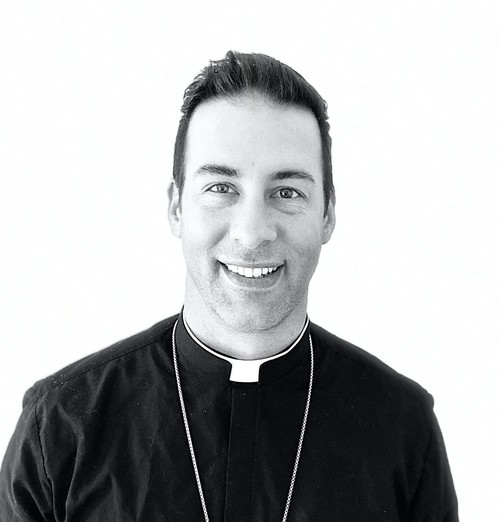The end of Epiphany is also called Pre-Lent. The Pre-Lenten season consists of 3 weeks - Septuagesima, Sexagesima, and Quinquagesima - devoted to preparing for Lent. That might seem like a long time to prepare, but each of us is probably more like a ship than a jack-rabbit, in need of time to turn our direction and our habits from season to season. And particularly this turn from a season of feasting to one of self-discipline, repentance, and prayer can be a difficult one. The color for Pre-Lent is purple.
Let’s look at the epistle (2 Corinthians 11:19-31) from Sexagesima, and discover how it might help prepare us for Lent. What can help or hinder our preparation for Lent?
You gladly put up with fools since you are so wise! In fact, you even put up with anyone who enslaves you or exploits you or takes advantage of you or puts on airs or slaps you in the face. To my shame I admit that we were too weak for that! Whatever anyone else dares to boast about—I am speaking as a fool—I also dare to boast about. Are they Hebrews? So am I. Are they Israelites? So am I. Are they Abraham’s descendants? So am I. Are they servants of Christ? (I am out of my mind to talk like this.) I am more. I have worked much harder, been in prison more frequently, been flogged more severely, and been exposed to death again and again. Five times I received from the Jews the forty lashes minus one. Three times I was beaten with rods, once I was pelted with stones, three times I was shipwrecked, I spent a night and a day in the open sea, I have been constantly on the move. I have been in danger from rivers, in danger from bandits, in danger from my fellow Jews, in danger from Gentiles; in danger in the city, in danger in the country, in danger at sea; and in danger from false believers. I have labored and toiled and have often gone without sleep; I have known hunger and thirst and have often gone without food; I have been cold and naked. Besides everything else, I face daily the pressure of my concern for all the churches. Who is weak, and I do not feel weak? Who is led into sin, and I do not inwardly burn? If I must boast, I will boast of the things that show my weakness. The God and Father of the Lord Jesus, who is to be praised forever, knows that I am not lying.
Turning to the season of Lent itself, this period of 40 days (plus Sundays) is a time where we are, in a sense, journeying with Jesus in his 40 days in the desert, voluntarily fasting and praying as He taught us to do, drawing evermore in closer communion with Him. Thus, during Lent, we intentionally engage, both individually and collectively, in the spiritual disciplines of prayer, fasting, and almsgiving. Lent is a reminder of our sinfulness, mortality, and limitations. It is also a reminder of God’s abounding grace to us in our current state. In that, Lent is a gift. The color for Lent is purple.
The observance of Lent has a long and storied history in the Church. Outside of the Bible, perhaps no single writing has had such a profound effect on Western Christianity as the Rule of St. Benedict. Benedict of Nursia (ca. 480-547) lived during a troubled, uncertain time in the wake of the collapse of the Roman Empire. He founded a monastery at Monte Cassino in 529, and wrote the Rule to organize the life of his community around prayer and work. Over the following centuries, the Benedictines spread Christianity and civilization across Europe. The Benedictines were particularly significant in medieval England, and at the time of the Reformation many Benedictine ideals passed into Anglican spirituality. Benedict’s Rule continues to influence the spiritual journeys of many Christians today, even those who live outside of a monastery.
In chapter 49 of the Rule, Benedict instructs his monks as follows:
The life of a monk ought to be a continuous Lent. Since few, however, have the strength for this, we urge the entire community during the days of Lent to keep its manner of life most pure and to wash away in this holy season the negligence of other times. This we can do in a fitting manner by refusing to indulge evil habits and by devoting ourselves to prayer with tears, to reading, to compunction of heart and self-denial. During these days, therefore, we will add to the usual measure of our service something by way of private prayer and abstinence from food or drink, so that each of us will have something with the assigned measure to offer God of his own will with the joy of the Holy Spirit. In other words, let each one deny himself some food, drink, sleep, needless talking and idle jesting, and look forward to holy Easter with joy and spiritual longing.
Benedict thus explains, based on his view of human nature, the advantage of having a season that we set aside as Lent. He helps us see Lent as a time not just for "giving up" something but also "taking on" something new, encouraging us to participate in them with "joy" and "spiritual longing." Note, too, the connection with Easter; we need both seasons as part of our liturgical year!
It may be helpful to memorize this stanza from the poem “Lent” by the English priest and poet George Herbert (1593-1633), who helps us have a balanced and Christ-centered view of Lent:
It’s true, we cannot reach Christ’s forti’th day;
Yet to go part of that religious way,
Is better than to rest:
We cannot reach our Saviour’s purity;
Yet we are bid, Be holy ev’n as he.
In both let’s do our best.
Let’s look at the epistle (2 Corinthians 11:19-31) from Sexagesima, and discover how it might help prepare us for Lent. What can help or hinder our preparation for Lent?
You gladly put up with fools since you are so wise! In fact, you even put up with anyone who enslaves you or exploits you or takes advantage of you or puts on airs or slaps you in the face. To my shame I admit that we were too weak for that! Whatever anyone else dares to boast about—I am speaking as a fool—I also dare to boast about. Are they Hebrews? So am I. Are they Israelites? So am I. Are they Abraham’s descendants? So am I. Are they servants of Christ? (I am out of my mind to talk like this.) I am more. I have worked much harder, been in prison more frequently, been flogged more severely, and been exposed to death again and again. Five times I received from the Jews the forty lashes minus one. Three times I was beaten with rods, once I was pelted with stones, three times I was shipwrecked, I spent a night and a day in the open sea, I have been constantly on the move. I have been in danger from rivers, in danger from bandits, in danger from my fellow Jews, in danger from Gentiles; in danger in the city, in danger in the country, in danger at sea; and in danger from false believers. I have labored and toiled and have often gone without sleep; I have known hunger and thirst and have often gone without food; I have been cold and naked. Besides everything else, I face daily the pressure of my concern for all the churches. Who is weak, and I do not feel weak? Who is led into sin, and I do not inwardly burn? If I must boast, I will boast of the things that show my weakness. The God and Father of the Lord Jesus, who is to be praised forever, knows that I am not lying.
Turning to the season of Lent itself, this period of 40 days (plus Sundays) is a time where we are, in a sense, journeying with Jesus in his 40 days in the desert, voluntarily fasting and praying as He taught us to do, drawing evermore in closer communion with Him. Thus, during Lent, we intentionally engage, both individually and collectively, in the spiritual disciplines of prayer, fasting, and almsgiving. Lent is a reminder of our sinfulness, mortality, and limitations. It is also a reminder of God’s abounding grace to us in our current state. In that, Lent is a gift. The color for Lent is purple.
The observance of Lent has a long and storied history in the Church. Outside of the Bible, perhaps no single writing has had such a profound effect on Western Christianity as the Rule of St. Benedict. Benedict of Nursia (ca. 480-547) lived during a troubled, uncertain time in the wake of the collapse of the Roman Empire. He founded a monastery at Monte Cassino in 529, and wrote the Rule to organize the life of his community around prayer and work. Over the following centuries, the Benedictines spread Christianity and civilization across Europe. The Benedictines were particularly significant in medieval England, and at the time of the Reformation many Benedictine ideals passed into Anglican spirituality. Benedict’s Rule continues to influence the spiritual journeys of many Christians today, even those who live outside of a monastery.
In chapter 49 of the Rule, Benedict instructs his monks as follows:
The life of a monk ought to be a continuous Lent. Since few, however, have the strength for this, we urge the entire community during the days of Lent to keep its manner of life most pure and to wash away in this holy season the negligence of other times. This we can do in a fitting manner by refusing to indulge evil habits and by devoting ourselves to prayer with tears, to reading, to compunction of heart and self-denial. During these days, therefore, we will add to the usual measure of our service something by way of private prayer and abstinence from food or drink, so that each of us will have something with the assigned measure to offer God of his own will with the joy of the Holy Spirit. In other words, let each one deny himself some food, drink, sleep, needless talking and idle jesting, and look forward to holy Easter with joy and spiritual longing.
Benedict thus explains, based on his view of human nature, the advantage of having a season that we set aside as Lent. He helps us see Lent as a time not just for "giving up" something but also "taking on" something new, encouraging us to participate in them with "joy" and "spiritual longing." Note, too, the connection with Easter; we need both seasons as part of our liturgical year!
It may be helpful to memorize this stanza from the poem “Lent” by the English priest and poet George Herbert (1593-1633), who helps us have a balanced and Christ-centered view of Lent:
It’s true, we cannot reach Christ’s forti’th day;
Yet to go part of that religious way,
Is better than to rest:
We cannot reach our Saviour’s purity;
Yet we are bid, Be holy ev’n as he.
In both let’s do our best.
You can learn more about Lent by watching our catechesis video on the topic.
Contact a spiritual director
Lent is often the time when people seek out the Sacrament of Confession or Spiritual Direction. If you'd like to contact any of our spiritual directors at Christ the King, simply click the images below.




